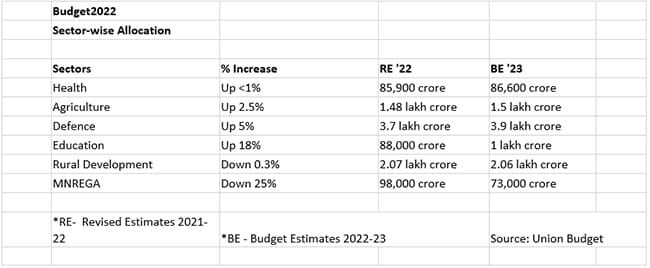
New Delhi: A substantial reduction in subsidies -- primarily for fertiliser, food and petroleum -- has been announced in the Union Budget presented by Finance Minister Nirmala Sitharaman for the financial year 2022-23 (FY23) on Tuesday.
The cut is deeper for food subsidies as the allocated amount got chopped off nearly 28 per cent. As per revised estimates for 2021-22 (FY22), the figure stood at Rs 2.9 lakh crore. The figure has now been reduced to Rs 2.1 lakh crore, a 27.59 per cent drop, Budget estimates for FY23 showed.
In the case of fertiliser subsidy, the figure has dropped to Rs 1.05 lakh crore from last year's revised number of Rs 1.40 lakh crore -- a fall of around 25 per cent.
Global fertiliser prices have surged over 200 per cent over the last 12 months after a record rise in the rates of the two main energy sources - coal and natural gas - used to produce the crop nutrients.
For petroleum, the subsidy cut is the lowest among the three; it has been reduced to Rs 5,800 crore from Rs 6,500 crore in FY22, down 10.76 per cent.
The government usually revises its budget for fertilisers and food subsidies upwards in the last few months of a fiscal year. But this has to be seen as the new fiscal year shapes up.
In India, subsidies generally form a tenth of the total annual expenditure planned for the year.
The move to reduce subsidies will be closely watched in the near term as Prime Minister Narendra Modi-led BJP government is going into polls in five states, including Uttar Pradesh.
In terms of sector-wise allocation, the health, agriculture, defence and education sectors have witnessed a hike in budgetary allocation.

Add image caption here
The allocations for MNREGA (Mahatma Gandhi National Rural Employment Guarantee Act) and rural development have dropped this year.
Essential Business Intelligence, Continuous LIVE TV, Sharp Market Insights, Practical Personal Finance Advice and Latest Stories — On NDTV Profit.























